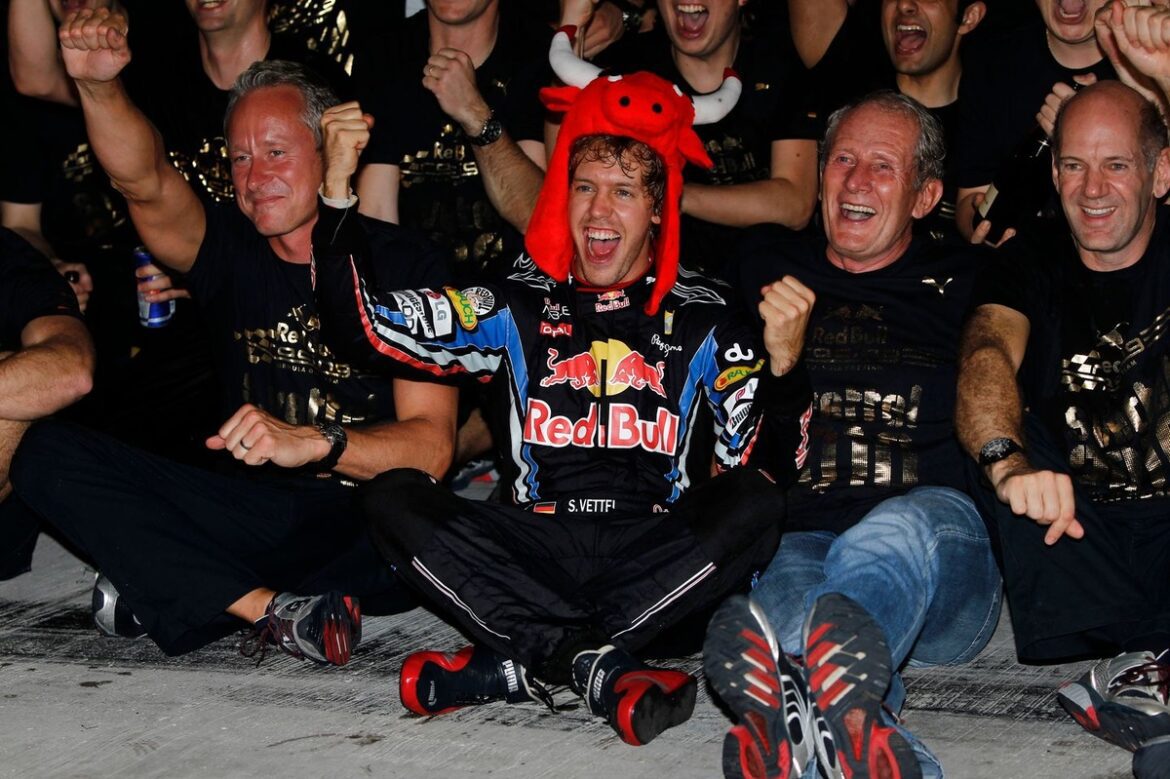Exploring the Future of Red Bull Racing: The Potential Legacy of Sebastian Vettel
Succession planning presents challenges for numerous leaders across industries, including business, politics, and even royalty. Many influential figures often view themselves as irreplaceable, considering potential successors as threats to their enduring authority. This phenomenon has been evident in the world of Formula 1, where anyone labeled as the next “Bernie Ecclestone” often found themselves under scrutiny and pressure.
Dr. Helmut Marko has carved out a unique niche in the F1 landscape. A contemporary and friend of Jochen Rindt, the only posthumous champion of Formula 1 managed by Ecclestone, Marko might have taken a different path in motorsport had circumstances allowed. In a different era, he could have been involved in the team that Ecclestone and Rindt envisioned when Jochen decided to step away from driving.
Marko was once a promising racing driver, honing his skills on the scenic mountain roads of Styria in Austria alongside Rindt, using a VW Beetle. Although his accomplishments in Formula 1 were limited, cut short by a combination of subpar machinery and an eye injury that forced his retirement in 1972, he showcased remarkable bravery and skill in sports car racing. He is particularly remembered for setting record lap times at the Targa Florio and achieving victory at the challenging Le Mans in the infamous and perilous Porsche 917.
As time passed, Marko formed a friendship with Dietrich Mateschitz, the co-founder of Red Bull, leading him to become the principal talent scout for the racing team. While data science was still in its infancy during Rindt’s time, Marko leveraged a wealth of telemetry data and his extensive experience to identify what true greatness in racing looked like.
Numerous aspiring drivers have benefitted from Red Bull’s support, yet not all have been able to thrive under Marko’s high expectations. Among the few who have succeeded is Sebastian Vettel, a four-time world champion and now a retired figure who seems to have an abundance of time on his hands.
Recently, Marko expressed his enthusiasm for Vettel potentially stepping into a more prominent role within Red Bull, calling him “the ideal successor candidate.” According to Marko, “I think Sebastian has found himself now. He knows what he wants to do in the future, and that is, first and foremost, motor racing.”
At the age of 81, Marko has faced considerable challenges in the F1 paddock, particularly following the passing of close friends Mateschitz and Niki Lauda. The transition of leadership at Red Bull after Mateschitz’s cancer-related death in 2022 has also contributed to a tumultuous environment. Marko’s role has been multifaceted, serving as a vital advisor and a constant presence, which has sometimes created tension with Christian Horner, the head of Red Bull Racing in the UK. However, the situation has stabilized recently, primarily due to Max Verstappen’s unwavering support for Marko, making clear that he would leave the team if Marko were to exit.
This political landscape in F1 is likely taking a toll on Marko, especially with the demands of travel becoming increasingly exhausting at his age. In contrast, Vettel is navigating a different phase of his life. After retiring at 35 to spend more time with his young family, he discovered a desire for new pursuits. He has engaged in various environmental initiatives and educational projects, but over the past year and a half, he has found himself drawn back to motorsport, despite having previously criticized it for its environmental impact.
Interestingly, Vettel has begun to support initiatives in Saudi Arabia, particularly those encouraging young women to participate in karting, indicating a shift in his view of the sport. Although a planned return to racing at Le Mans did not materialize, Vettel has been collecting historic cars, including a former Nigel Mansell Williams FW14B and a McLaren MP4/8, and has showcased these vehicles using sustainable fuels. Despite retiring with substantial wealth, it appears he may be seeking additional avenues for income, particularly through his recent commitments.
If Vettel were to take over Marko’s responsibilities, it could benefit Horner, who maintains a good rapport with the former driver. The question arises: what would a Vettel-led Red Bull young driver program resemble?
It’s likely that Vettel’s approach would be softer and more nurturing compared to Marko’s famously tough demeanor. Marko has a reputation for his zero-tolerance policy towards underperformance, evidenced by a long list of young drivers who have faced dismissal or demotion after failing to meet expectations. There are numerous anecdotes of drivers winning races only to be swiftly reminded by Marko of their mistakes—often demonstrated through data analysis that highlights areas for improvement.
Vettel, known for his more personable approach, might introduce a more supportive atmosphere while still upholding high standards for success. During an entertaining appearance at the Autosport Awards in the past, Vettel humorously imitated Marko and shared stories of his experiences under Marko’s mentorship. He recounted instances where, despite achieving commendable results, he was confronted with critiques that pushed him to improve further.
For Vettel to effectively discover the next Max Verstappen or even another Sebastian Vettel, he would need to embrace a similar perfectionism to that embodied by Marko. This duality of nurturing talent while demanding excellence presents a fascinating dynamic that could redefine the future of youth development within Red Bull Racing.
In summary, the transition of leadership in Formula 1, particularly within the context of Red Bull Racing, is a pivotal moment that could shape the sport’s future. As Dr. Helmut Marko contemplates retirement, the potential emergence of Sebastian Vettel as a successor brings both excitement and uncertainty. The evolution of Red Bull’s young driver program under Vettel’s influence could lead to a new era of talent nurturing, blending rigorous expectations with a more compassionate approach. The world of Formula 1 eagerly awaits the unfolding of this narrative, where past legacies meet future ambitions on the racetrack.
